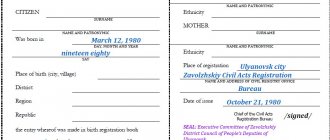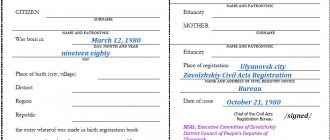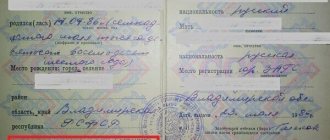Modern Russian legislation has established one important rule regarding citizenship. A child born to Russian parents automatically acquires Russian citizenship
. No action is required. At the same time, many people know that in special cases a stamp indicating the fact of citizenship is placed on one of the sides of the certificate. Based on this, the question automatically arises of who needs to make such a print. And if such a need arises, where is the stamp affixed? Information about this issue is presented in the article.
Main legal provisions
Previously, to confirm the Russian citizenship inherent in a minor, one standard document was not enough. Those born in Russian cities received a special supplement along with the certificate. Without it, it was impossible to obtain a Russian civil passport and become the holder of a foreign passport.
Since 2007, the situation regarding citizenship has changed radically. A new rule on Russian citizenship, No. 62-FZ, has come into force. Instead of an additional insert, imprints are placed on the certificate itself.
Features of the document
A standard birth certificate is a newborn's first official document. It confirms his identity in Russia until he is a full 14 years old.
Information that is important for a future citizen is written here, such as:
- Child's full name.
- Information about parents.
- Date and city of birth.
Important!
The certificate is obtained within a month after the date of birth.
Proof of citizenship for children born before July 2002
It is worth noting that a certificate confirming the status of a Russian citizen for minors can be a birth registration certificate or an insert issued abroad. It is worth noting that this certificate is subject to translation and notarization.
Required documents:
- Passport of both parents (if the family is complete).
- Birth certificate
Do not laminate your birth certificate until it has the required stamps, otherwise you will have to re-issue the certificate, which will take extra time.
The citizenship stamp on the birth certificate is legal confirmation of the fact of citizenship of the Russian Federation. Along with it, there is an insert that was issued to confirm the fact of citizenship. The insert created numerous bureaucratic difficulties; parents had practically no opportunity to implement their children in various social spheres and sectors without this certificate. By canceling the insert, the authorities have significantly simplified the procedure for accepting minors as citizens without obtaining a residence permit.
Today, there are various commercial enterprises that provide support and paperwork services. Experienced lawyers can help register citizenship for Russian minors. Specialists will submit and process certificates as quickly and legally as possible. The services of lawyers will help the applicant save his own effort and time.
The certificate is used as an identification document for children when traveling abroad. It is important that the document contains information about the citizenship of the minor and information about the persons responsible for him. This will allow you to avoid conflict situations when passing through customs control.
If one of the parents is deprived of parental rights or is initially absent, then all information about the primary guardian is provided to government authorities.
Mandatory mark
According to adopted changes in legislation and new provisions, children born after July 1, 2002 automatically become Russian citizens. But this rule applies under the following important conditions:
- Both parents have Russian citizenship. In this case, the city of appearance does not matter.
- Both relatives live in Russia, but at the same time they are citizens of another country. They may also not have any citizenship. But there is a condition here - the country of which the parents are considered subjects did not grant the child its citizenship for certain reasons.
- One of the parents has a Russian passport, while the other does not have any citizenship or his location is unknown to relatives.
You can affix a stamp that confirms your legal status at the request of your relatives. At the same time, the fact of Russian citizenship for children is recognized. It is important to have a corresponding entry about them in the parents’ regular passports.
Who may need a stamp
The stamp established by law, reflecting the affiliation of the Russian Federation, is usually placed on the back of the child’s certificate. It is not affixed in all cases and not to everyone, but when necessary. There are several cases in which a stamp is required:
- Registration of a standard international passport.
- A teenager receives an internal identity document upon turning 14 years old.
- The procedure for obtaining a certificate for mat/capital.
- Registration at a specific address.
- Trip to some states.
Also, a mark will be required if the personal document does not contain information that the father and mother are Russians.
At the same time, we can note other situations when the presence of one certificate is not regarded as a fact of possessing citizenship, that is, when it is impossible to do without an official mark:
- The child was born outside of Russia. On the basis of which he did not receive an indigenous status of another state by right of birth. A similar case is typical if one of the parents is Russian, and the second is considered a citizen of another country;
- The child was born in the Russian Federation, but both parents at the time of birth were citizens of another country or did not have the required citizenship at all.
Expert opinion
According to the law, the official documents that will confirm citizenship are a standard passport, which is issued at the age of 14, and an international passport. If there are two documents available, there is no point in affixing an additional stamp.
Employee of the Kolomna District Migration Service, Sergey Vladimirovich Aleksin.
Documents for imprint
Important!
The list of necessary papers and certificates that may be required for the stamp depends on the situation.
The city of birth and the exact date matter. The nationality of relatives is also important. Each situation and the documents specific to it should be considered in more detail.
Born after July 1, 2002
You need to provide your parents' passports and the certificate itself. If the relatives are officially married and have a Russian document, one of them can put a mark.
If a minor was born before July 1, 2002, confirmation of the fact that his parents lived in the Russian Federation must be provided. It is equally important to prove citizenship at the time of the minor’s birth.
Absent parent
In such a situation, you will need to provide the organization with:
- Death certificate, if the person died;
- A certificate from the police, which proves that the location of the person in the process of conducting special search activities has not been identified;
- An official verdict from the court regarding the deprivation of the rights of one parent;
- An official certificate from the registry office that the father was recorded from the words of the mother.
Foreign parents
If a minor was born in Russia, but his parents are citizens of another country, you will need to collect the following certificates:
- Statement written by both parents.
- Civil passports of the Russian Federation.
- Previously issued residence permit.
An official document obtained from an authorized organization of the country of which they are citizens. It contains information that the child, for a certain reason, does not have the right to become a citizen of their state.
Important!
After confirming the official citizenship of the Russian Federation, his relatives will be able to officially apply for a standard passport.
Stateless child
If a child was born to stateless parents, along with standard documents, you need to collect papers that establish this particular factor.
No passport
If relatives are citizens of the Russian Federation, but have lost their passport or are changing it, they should provide another official document that could confirm the fact of their residence in Russia as of February 6, 1992. This can be confirmed with the following documents:
- Work record book, if the person was employed;
- Extract from the standard house register;
- Military officer, where a mark of completion of the required service is usually placed;
- A special registration card, issued in a special form No. 9.
This rule applies to children born before July 1, 2002. Their relatives must provide the above evidence.
Foreign parent
When one of the relatives is considered a citizen of another country, the assignment of citizenship to him is automatically initiated. The following documents are collected:
- Official consent of the parent, who is a foreigner, that it is required to grant the child Russian citizenship. It must be certified by a notary.
- Application drawn up according to the sample.
- Passport of a foreign citizen.
- Registration for a child born in Russia. Having a residence permit is also suitable.
- Two photos taken according to the rules.
- Translated child certificate. It must be certified by a notary and affixed with an apostille. This is relevant when the child was officially born outside of Russia.
If the teenager is already 14 years old, his official consent will be required to obtain the required Russian citizenship.
If the child was born abroad
Now let's look at how to indicate citizenship on a birth certificate for a child born abroad.
A child born abroad, whose both parents or one of them are Russian citizens, can also count on receiving the status of a citizen of the Russian Federation, but if in the first case this is done automatically, then in the second the procedure for admission to citizenship is carried out in a simplified manner.
To do this, you need to contact a consular office or diplomatic mission of the Russian Federation in another country. The documents you will need are the parents' passports and a birth certificate issued by the medical institution where the baby was born. It will need to be translated into Russian and notarized, then stamped on it, after which a mark on citizenship will be placed.
If one of the legal representatives is a foreigner, the newborn does not receive Russian citizenship by right of birth. In this case, the process of accepting Russian citizenship for the minor is initiated, for which you will need to provide:
- completed applications from both parents;
- their ;
- consent of the foreign parent;
- birth certificate with a notarized translation into Russian, certified by an apostille;
- photographs of the child;
- marriage certificate, information about place of residence;
- document confirming payment of the consular fee of 65 US dollars.
A child born abroad is not issued a Russian certificate. As a rule, along with a note on the certificate from the place of birth, he, as a full citizen of the Russian Federation, is issued a foreign passport.
In addition to the consular fee, you will need to pay for the following services:
- for issuing an old-style foreign passport to a child - 10 US dollars, with an electronic storage medium - 40 US dollars;
- for certification of correct translation from a foreign language into Russian – 25 US dollars (per page);
- for certifying the authenticity of a signature on documents - $10;
- for consular legalization of documents – $30 (for each document).
Stamping procedure
To affix the required stamp, you will need to appear at the Main Migration Department of the Ministry of Internal Affairs. This is an organization located strictly at the place of official registration of teenagers or relatives.
The procedure for adding a stamp to a document is accompanied by an oral statement. If a citizen is abroad, he applies to the consulate of the state in which he resides or to the special diplomatic mission of Russia.
Algorithm of actions
The operation of affixing the required stamp is quite simple. It has been simplified since the beginning of 2007. The action algorithm looks like this:
- Parents of children born after July 1, 2002 contact the appropriate organization with a passport and a well-written application.
- The necessary documents are provided.
- Immediately after a thorough check of the papers and a correctly written request, the required mark is made.
This operation usually takes one day. There are no temporary delays noted.
Terms and cost of registration
Such a procedure is considered entirely voluntary. There is no need to pay a state fee for its implementation. An exception will be the situation when the children were born outside the Russian Federation, and the parent is considered a citizen of another country. In such a situation, you will need to pay a small fee. It is paid for conferring the required citizenship on a minor. The contribution amount is 65 dollars.
Here the procedure also does not take more than one day. An increase in the period for obtaining a new seal is possible if the child was born before the specified date. The reason lies in certain bureaucratic delays.
Old style international passport
The old passport, which allows a child to travel abroad, has fewer pages. The data is read by inspectors.
Differences between the old passport and the new one
This document remains in demand for the following reasons:
- the cost of its registration is 2 times less;
- Minors under 14 years of age do not have to be personally present at its registration.
The main disadvantages of the old passport:
- short period of validity – 5 years;
- it can be faked;
- Data is recorded manually, which takes a lot of time.
The procedure for obtaining a foreign passport is standard: the interested person collects documents, submits an application and receives a passport.
List of required documents:
- original and 2 photocopies of national passport;
- 4 photos;
- receipt for payment of state duty.
You need to apply for a foreign passport to the territorial division of the Main Directorate for Migration Affairs of the Ministry of Internal Affairs of the Russian Federation.
Common Mistakes
In the process of resolving an issue directly related to the citizenship of a child, parents make quite a lot of mistakes. To avoid them, it is worth studying the most common ones and options for solving them.
Mistake 1. Many complicate this situation by collecting documents to obtain an insert on the child’s citizenship.
This additional document has been completely canceled since 2007. It is replaced by the same seal on the certificate. Due to this, the fact of citizenship was significantly simplified and accelerated. If the insert is already on hand, it is considered valid. It replaces the stamp. There is no need to put down additional marks.
Error 2. Parents who fill out the documents believe that the stamp on the certificate was placed incorrectly.
Typically the stamp is placed in the upper corner on the back of the certificate. But in many organizations the seal was placed on the front side. In both situations it will be considered valid. In other words, it does not matter where the stamp is placed in the document. It will be valid in any case.
Popular questions
There are also quite a lot of questions about the mark itself. Parents often wonder what it looks like and what information it should reflect.
Question No. 1. What does the citizenship stamp represent?
This seal looks like a rectangular stamp. It should contain information:
- The child is a Russian citizen;
- The provision of the law on the basis of which this status is assigned;
- The official name of the organization that affixed the imprint;
- Number of stamping.
Without reflecting such data, the seal will not be considered authentic.
Question No. 2. What elements confirm the authenticity of the print?
The seal must contain the signature of the responsible employee. A round stamp is also affixed. It must belong to the organization that made the imprint.
No imprint
If there is no stamp on the certificate, there is no administrative liability. The seal is issued strictly on your own initiative. Simply, in order to avoid certain problems when traveling to certain countries or when filling out certain papers, you should definitely put a stamp. If the child’s certificate already contains information that the child’s relatives are citizens of the Russian Federation, the requirement for a mark may well be regarded as unlawful.
As for possible problems and delays in time, they usually arise if the child was born before the date prescribed by law. If he does not have a mark by the time the adult document is issued, this will be denied.
According to modern legislation, a passport should be issued within a month after the birthday and the age of 14. To avoid problems, the stamp should be affixed in advance. The procedure does not take a lot of time and does not cause difficulties.
Procedure for obtaining citizenship
In 2002, the Law “On Citizenship” was adopted. It describes situations in which it is possible to establish a connection between the state and the individual. And also the procedure for obtaining citizenship itself. Citizenship can be obtained in two ways: ordinary and simplified.
As usual , this document is issued by fully able-bodied migrants who have reached the age of majority. Provided that the person has a residence permit in the Russian Federation for more than five years and has not left its territory during this time, is employed in accordance with the Labor Code of the Russian Federation, is ready to renounce his previous citizenship, has knowledge of the Russian language at a conversational level and is able to confirm this through testing .
The length of residence may be reduced to four years under certain circumstances.
- The man asks for water. asylum in the Russian Federation if there are valid reasons;
- The migrant's profession is rare and in demand;
- The person has refugee status and is entitled to benefits.
A simplified procedure is provided for people of the following categories:
- Are close relatives of residents of the Russian Federation;
- Born on the territory of the former Soviet Union.
- Former citizens of the USSR;
- Those who underwent military training on the territory of Russia or in the Union Republics.
The simplified procedure exempts a person from obtaining a temporary residence permit (TRP). This process significantly reduces documentation time.
This video will help you understand what methods exist to obtain Russian citizenship. An experienced specialist talks about various life situations that not only migrants, but Russians face. After watching the video, a person will have a general idea of where to go with this problem.










